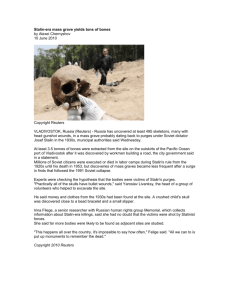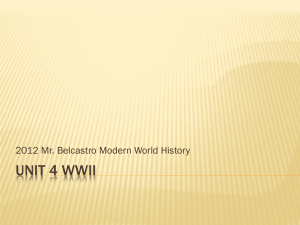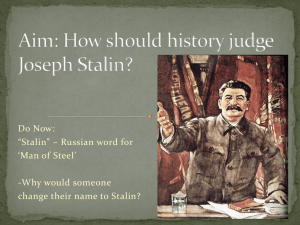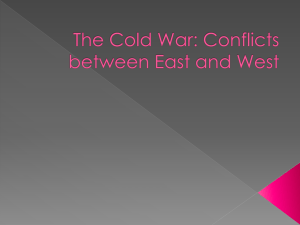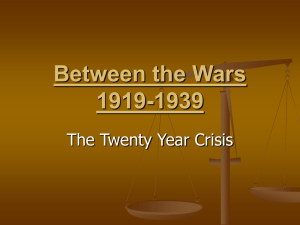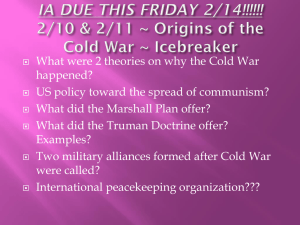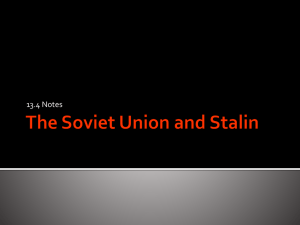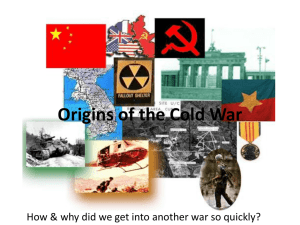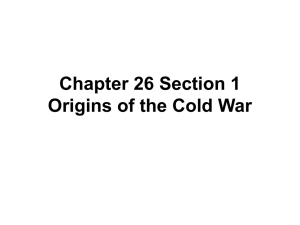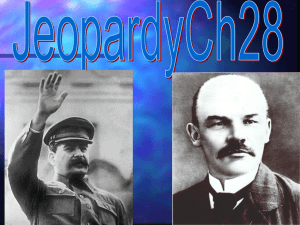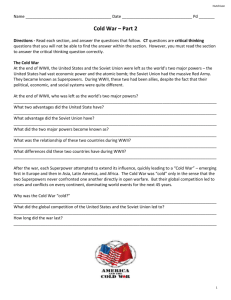Time period for the paper
advertisement
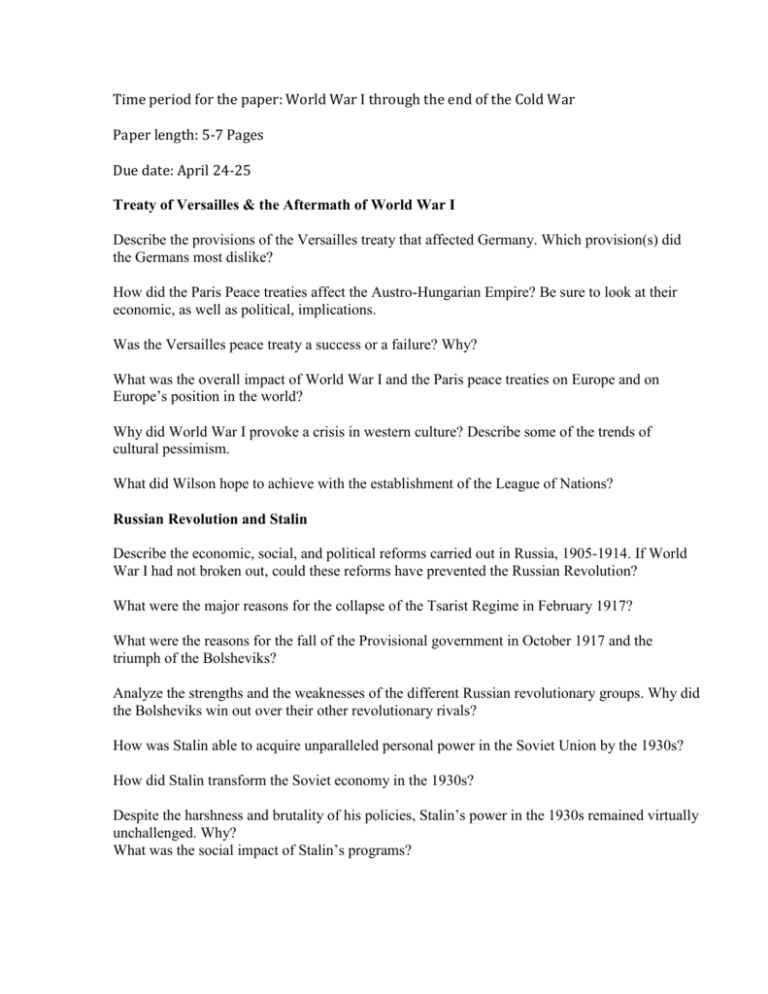
Time period for the paper: World War I through the end of the Cold War Paper length: 5-7 Pages Due date: April 24-25 Treaty of Versailles & the Aftermath of World War I Describe the provisions of the Versailles treaty that affected Germany. Which provision(s) did the Germans most dislike? How did the Paris Peace treaties affect the Austro-Hungarian Empire? Be sure to look at their economic, as well as political, implications. Was the Versailles peace treaty a success or a failure? Why? What was the overall impact of World War I and the Paris peace treaties on Europe and on Europe’s position in the world? Why did World War I provoke a crisis in western culture? Describe some of the trends of cultural pessimism. What did Wilson hope to achieve with the establishment of the League of Nations? Russian Revolution and Stalin Describe the economic, social, and political reforms carried out in Russia, 1905-1914. If World War I had not broken out, could these reforms have prevented the Russian Revolution? What were the major reasons for the collapse of the Tsarist Regime in February 1917? What were the reasons for the fall of the Provisional government in October 1917 and the triumph of the Bolsheviks? Analyze the strengths and the weaknesses of the different Russian revolutionary groups. Why did the Bolsheviks win out over their other revolutionary rivals? How was Stalin able to acquire unparalleled personal power in the Soviet Union by the 1930s? How did Stalin transform the Soviet economy in the 1930s? Despite the harshness and brutality of his policies, Stalin’s power in the 1930s remained virtually unchallenged. Why? What was the social impact of Stalin’s programs? Did Stalin’s great economic achievement justify the cruelty and repressive nature of his regime? Give an overall assessment of his years in power. How successful were the communists in spreading their beliefs to countries outside Russia during the period 1919-1939? What changes did industrialization bring to Russia before 1914? To what extent did industrialization change Russian society? How did Lenin define imperialism? What, in his view, would result from colonialism? What was war communism? How effective was war communism as a policy? How did the U.S.S.R. attempt to resolve the problem of nationalism? What was the role of the Communist party in the U.S.S.R.? How did membership affect the lives of individuals in the U.S.S.R.? What were Trotsky’s contributions to Marxist thought? How were his ideas received within the U.S.S.R.? How did Marxists in both eastern and western Europe differ on the issue of international wars? Interwar Years To what extent did democracy triumph during the 1920s? What problems did it face, particularly in Eastern Europe? Where did it fail? Describe and evaluate the diplomatic efforts made during the 1920s to resolve post-war European tensions. Compare and contrast the anti-imperialist movements in India and China during the 1920s and 1930s. Compare the impact of socialism and Marxism in Europe to their impact in Asia. Where, in your opinion, were they more influential? How did the new eastern European states attempt to modernize themselves? How successful were they? How democratic was the Weimar Republic? How did the Russian Revolution stimulate anti-imperialism in Asia? In what ways did the Young Turks and Mustapha Kemal transform Turkish society? 1920s & 1930s – Italy, Germany, and the Soviet Union Compare and contrast the anti-Depression policies of the western democracies with the policies of fascist Italy and Nazi Germany. Explain the circumstances that led to the triumph of Mussolini and Fascism in Italy. Discuss the major political and economic crises in France during the interwar years. Why did France not succumb to a Fascist dictatorship? What are the characteristics of a totalitarian state? How well did Fascist Italy, Nazi Germany, and Stalinist Russia fit the definition of totalitarianism? In what ways did totalitarianism aspire to resolve class conflict? Was it effective in doing so? The 1930s and World War II Evaluate Hitler’s foreign policy between 1933 and 1939. Why did he enjoy so many successes? Appeasement was a long-standing and often useful diplomatic device. Why did it fail in the 1930s? At what point should statesmen like Neville Chamberlain have recognized that appeasement was not a viable policy? What was the military turning point in World War II, the point after which the Allies steadily advanced and the Axis could no longer hope to win? Evaluate the outcome of the agreements reached at the Yalta conference. Was this outcome a consequence of the agreements themselves, or of Stalin’s betrayal of the agreements? Were there other, reasonable alternatives available to Churchill and Roosevelt that might have prevented Eastern Europe falling under Soviet control? What set off the Spanish Civil War? How did the conflict divide the world? Describe the strategy of the final Allied offensive in 1944-1945. What was the “final solution”? How and where did the Nazis implement it? How was the United Nations originally organized? What were its responsibilities? Describe the factors that led to the development of the Cold War between the United States and the Soviet Union. Which country was more responsible for the outbreak of the Cold War? What economic challenges did the Soviets face after 1945? What were the approaches of Khrushchev and Brezhnev to resolving the economic problems of the U.S.S.R.? How did Mao attempt to build up China’s economy and revolutionize its society? What were his successes and failures? How did Japan change after World War II? What brought about those changes? What was the role of Algeria in the fall of France’s Fourth Republic? Evaluate the Great Leap Forward and the Cultural Revolution. What were the consequences of each? Post-war World How did religious and ethnic conflicts shape the experiences of many of the newly independent countries of Asia? How did these countries attempt to overcome these conflicts? How would you evaluate the methods used by various rulers? Evaluate the economic experiences of the former European colonies in Asia that received their independence after 1945. What have been their achievements since independence? What difficulties have they encountered? In terms of economic development, what have been the major problems and obstacles for Latin America in the post-war years? Why has democracy proved so elusive in Latin America in the post-war period? Consider specific examples in your response. What were the legacies of colonialism in Latin America/Africa/ Asia? How have these legacies affected Latin American/African/Asian countries in the twentieth century? Ending colonialism was easier for some colonial powers than others. Analyze the policies of such European states as Britain, France, Belgium, and Portugal as they withdrew from political control in Africa and Asia. What were the consequences of these different approaches for new nations? For decades, one of the world’s most intractable problems was apartheid in South Africa. Yet suddenly in 1994, South Africa made a relatively peaceful transition to full democracy. Explain the reasons for the development of apartheid and then its end, together with the end of white political rule, by 1994. Where has the UN intervened in recent decades? How successful have those interventions been in restoring peace? Trace the origins of the Arab-Israeli conflict and then the peace process. Why has peace in the region proved so elusive? Beginning with the Iranian revolution of 1979, there has been an Islamic revival throughout the Middle East and in Islamic countries in North Africa and Asia. Why has this revival taken place? Compare Nkrumah, Kenyatta, and Nyerere. Which African leader accomplished the most? The least? Why have both the World Bank and the IMF become targets of criticism over the course of the past decade? How have these institutions responded to these criticisms? Why did détente give way to a new phase of the Cold War at the end of the 1970s and during the 1980s? Trace the history of the nuclear arms race over the course of the twentieth century. Which side of the security debate (deterrence vs. disarmament) do you find most persuasive? How did Deng Xiaoping seek to transform China’s society and economy? What was the relationship between his reforms and the Democracy Movement? What was the outcome of the latter? Deng believed that China, for all its economic advances, was unprepared for democracy. He thought that it would only breed chaos and confusion, as it had during the Cultural Revolution, and that it would also interfere with the order and stability needed for economic growth and modernization. Do you agree or disagree with Deng’s position? Why or why not? What obstacles did Europeans face in attempting political and economic union? What were the social, economic, and political reasons for the collapse of the Communist regime in the former Soviet Union? How did Gorbachev attempt to reform communism in the Soviet Union? Why did he fail, and instead, open the way for an anti-communist revolution? East Germany, Poland, Hungary, Bulgaria, and Romania all overthrew their Communist rulers in 1989. Compare and contrast the experiences of two of these countries with the transition from communist societies to democratic, capitalist ones. Why did the U.S.S.R. collapse with the end of communism? What kind of organization replaced it? How did this new organization differ from the Soviet Union? An explosion of nationalism, both in the former Soviet Union and in Eastern Europe followed the collapse of communism. Explain its origins, nature, and the consequences. What role did mass movements play in the fall of communism in central and Eastern Europe? How did the reunification of Germany occur? What concerns did reunification raise? Compare Yeltsin’s rule to Gorbachev’s. Which leader do you think was more instrumental in bringing about the dissolution of the U.S.S.R.? What were the roots of the conflict in the Balkans? How did the history of that conflict affect the willingness of the international community to become involved? Why did NATO, in 1999, undertake its first military offensive? How was this “humanitarian intervention” justified? Why was it controversial? How did the Cold War impact the economic, political and social structures of the developing world? Choose one country to use as a case study and explain the impact of the war on that country."
